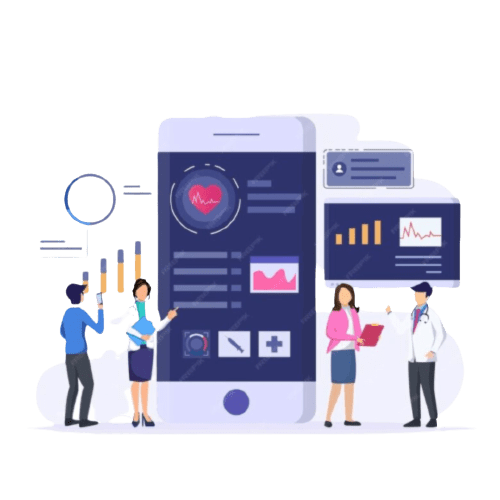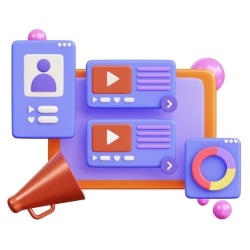Attract students, build trust, and boost enrollment with powerful digital marketing strategies. Discover how to leverage SEO, social media, content marketing, and more to reach your target audience and achieve your educational institution’s goals.


What is Educational Marketing?
Education marketing is a targeted approach to promote educational institutions and offerings to prospective students, parents, educators, and donors. Its focus is on building brand reputation, generating leads, promoting specific programs, and enhancing student engagement and retention.
Through strategies like content marketing, social media, SEO, paid advertising, email campaigns, and events, education marketing aims to maximize reach, efficiency, brand trust, personalization, and data-driven decision-making.
why education sector needs digital marketing
Digital marketing is a vital tool in the education sector that helps educational institutions disseminate information, promote themselves, solve problems, and reach audiences they could not reach before. This is of great benefit to the education sector, as it costs less than traditional marketing.
Dissemination of Information: The most obvious benefit for schools from using digital marketing is how important the Internet has become over the last decade. The ability to spread information at lightning speed has increased, making transmission of information not only astronomically fast, but also cheaper and easier than ever before.
Now, when looking for good education options, parents are much more likely to look online rather than in the local newspaper. If people are browsing online and their first intent is not to find a school, effective digital marketing will likely bring the advertised institution to mind, which may lead to future decisions or conversations.

Our Approaches To Digital Marketing For Educational Sector

Video Marketing for the Educational Sector:
Video marketing is highly engaging and versatile, promoting social sharing. To optimize, create high-quality content like explainer videos, testimonials, virtual tours, and interviews, and optimize for YouTube SEO. Promote on social media and websites, and consider video advertising. Tools include YouTube, Vimeo, Wistia, and Screencastify.
Educational Sector Online Reputation Management:
Online reputation management is vital for educational institutions as it protects brand image, builds trust, fosters positive sentiment, and encourages enrollment. To optimize, monitor online reviews, encourage positive feedback, address negatives professionally, and use social media listening tools like Google Alerts, Mention, Brand24, and Sprout Social


E-Mail Marketing Services for Educational Sector
Email marketing is cost-effective and personalized, driving targeted engagement and nurturing leads efficiently. To optimize, segment email lists based on demographics and interests, create personalized campaigns, automate key sequences like welcome messages, and track metrics for continuous improvement. Tools like Mailchimp, Constant Contact, ActiveCampaign, and Klaviyo facilitate precise execution.
Educational Sector Content Marketing:
Content marketing attracts organic traffic, establishes thought leadership, educates potential students, and improves SEO. To optimize, create high-quality content like blog posts, articles, infographics, white papers, and ebooks tailored to your audience’s needs. Consistent publishing and promotion on social media, email, and paid channels, along with guest blogging, enhance visibility. Utilize tools like WordPress, HubSpot, BuzzSumo, and SEMrush for streamlined execution.


Social Media Marketing for Educational Sector
Social media marketing fosters community, boosts brand awareness, enhances student engagement, and promotes events and programs. To optimize, select appropriate platforms (e.g., Facebook, Instagram, LinkedIn, Twitter), create engaging content (e.g., student stories, polls, live Q&A sessions), utilize targeted ads, and analyze metrics for improved engagement. Tools like Hootsuite, Buffer, Sprout Social, and Later aid in precise execution
PPC Marketing for Educational sector
Paid advertising provides highly targeted, quick results, driving specific actions like course sign-ups or event registrations. To optimize, define clear campaign goals, target relevant keywords, create compelling ad copy and landing pages, utilize website retargeting, and monitor performance closely, adjusting bids and budget allocation as needed. Leveraging tools like Google Ads, Microsoft Ads, Facebook Ads, and Twitter Ads ensures precise execution.


Local Education SEO:
Local SEO improves visibility in local search results, attracting nearby students and increasing website traffic. To optimize, claim and optimize your Google My Business listing, get listed in relevant local directories, build backlinks from local sources, and create localized content. Tools like Google Search Console, Moz Local, and SEMrush facilitate precise execution.
Benefits of Digital Marketing Services for Educational Institutions
In today’s digital age, where information is readily available at our fingertips, educational institutions face a unique challenge: attracting and engaging students in a crowded online space.
Traditional marketing methods, while still valuable, often fall short of reaching the tech-savvy generation who rely on the Internet for research and decision-making. This is where digital marketing services come in, offering a powerful toolset to connect with target audiences and achieve strategic goals.
Builds Credibility: A strong digital presence positions your institution as a trusted authority and reliable information source. Engaging content, favorable online reviews, and active social media participation demonstrate transparency and educational excellence, building trust with potential students and parents.
favorable online reviews, and active social media participation demonstrate transparency and educational excellence, building trust with potential students and parents.
Improves Ranking: SEO boosts your website’s search engine ranking, making it easier for potential students to discover your programs or information. This visibility spike leads to increased website traffic, ultimately resulting in more applications and inquiries.
Increase in Profit: Non-profit institutions prioritize social impact, but digital marketing can still generate revenue.
Paid advertising campaigns targeting specific demographics can reach high-potential students who may not have considered the institution otherwise. Online courses and resources can also be offered for purchase, creating a new income stream.
Immediate Feedback: Traditional marketing lacks feedback mechanisms, leaving effectiveness to guesswork. Digital marketing offers real-time data and analytics, enabling tracking of website traffic, social media engagement, and ad performance
High Conversions: Digital marketing goes beyond just generating awareness; it can nurture leads and convert them into enrolled students.
By providing engaging content, personalized communication, and clear calls to action, you can guide potential students through the admissions process and encourage them to choose your institution.
Easy Access to the Target Audience: Digital marketing enables direct connection with the target audience through preferred platforms like social media, email, and online forums, replacing reliance on brochures and local advertising. This targeted approach ensures messages reach students and parents effectively, maximizing marketing efforts.
This is a rough estimate. If you want to know about educational marketing then click here







Leave A Comment